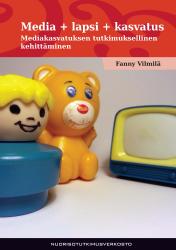Media + lapsi + kasvatus: Mediakasvatuksen tutkimuksellinen kehittäminen

Downloads
Keywords:
lapset (ikäryhmät), nuoret, mediakasvatus, tutkimus, kehittäminenSynopsis
The project Development of research on media education surveyed research on children’s media education and, in cooperation with professionals in media education and media education research, outlined guidelines for future research on media education for children and young people. The project also explored the possibilities associated with the applicability and popularization of knowledge.
In this project, media education research is understood as a broad entity comprising content themes significant for media education. Research refers to both scientific research and less academic surveys and reports. The project results take concrete shape in the future vision for research on children’s and young people’s media education which, through future orientation, presents the needs for research on children’s and young people’s media education particularly from the perspective of the development of research. The project is divided into four parts: 1) a survey of research that has been done; 2) discussions held with experts of the cooperating bodies; 3) a questionnaire targeted at actors; and 4) work on the future vision for research on children’s and young people’s media education.
In all, 515 studies, surveys and reports linked with 0–12 year-old children’s media education done in Finland in 2000–2014 were selected for the survey. Of these, 65% were theses and 35% were other studies, reports and surveys. Two-thirds of the theses are linked with education sciences. A relatively greater share of the theses are qualitative case studies, observation and studies utilizing action research methods. In other studies, reports and surveys, the data often comprise questionnaires, interviews, and listings. The theses concentrate in particular on media relations, media use and media education methods. The other studies, surveys and reports most often provide support for the choice of media education methods, for conceptualization of the media environment and media relations, and for justification of the need for media education.
In the discussions held with experts in media education and media education research, one of the central issues that came up was: what types of issues in relation to the media do children encounter in society, and how. In connection with adults, emphasis was placed on the need to examine how the guardians of children and young people relate to the media and, through this, their media education skills. Some demands for research on media education terminology and concepts surfaced in the discussions. The development of media education research should focus in particular on multidisciplinary, qualitative research and longitudinal research.
On the questionnaire, media education research was characterized as an important element in describing and understanding phenomena of the media and media education. It was hoped that the focus of research would be on qualitative research, but the importance of quantitative research to the whole was also recognized. The utilization of research findings in the planning and targeting of education was an often repeated theme.
In the future vision for research on children’s and young people’s media education, children’s and young people’s media education is conceived as a broad phenomenon which combines themes of the media, childhood and youth, and education. The role of research in children’s and young people’s media education is not only the production of a conceptual grip but is also strongly linked with the development of practices. It is pivotal to create the preconditions for utilizing studies in many fields so that the processes and results of academic basic research, applied research as well as surveys and reports would complement each other.
The vision outlines three priorities that overlap in both research and media education work:
Priority 1. Media-driven media education research examines the media as the environment where children and young people live, function, experience emotions and grow. What does living in a media society and culture mean for children and young people?
Priority 2. Media education research focusing on children and young people concentrates on what happens in children’s and young people’s relation to the media and the significance of this. Aside from the relation to the media, media education is taken into account from the perspectives of media use, media-related emotions and mental images, as well as child and youth cultures.
Priority 3. The focal point of education-driven media education research is research supporting media skills and meta skills, the development of critical thinking, and the shaping of courses of action and thought models. Thoughts about the learning and growth environment can be examined from the perspectives of institutions, the home, culture and peer relations, taking education phenomena into account.
Implementation of the priorities of the future vision for research on children’s and young people’s media education requires a research approach tackling the production and publication of knowledge at various stages and cooperation possibilities transcending borders. As a critical success factor, the research-based development of media education can be conceived from three perspectives: the generation of new openings; knowledge closely linked with activities; and a knowledge-based approach. These three perspectives are connected by dialogue and multi-method research as the preconditions for research-based development.
Interaction at the levels of both activities and knowledge involves the idea that not only professionals in media education and media education research but also, for example, children and young people, guardians and administrative staff serve as active players. Professional coordination and the testing of familiar working methods promote a dialogic operating and research culture. Concrete encounters and joint action at various stages of the research open up possibilities for both new and proven multi-method research forms. Careful resource allocation and investment in entities support the qualitative development of research on children’s and young people’s media education.



